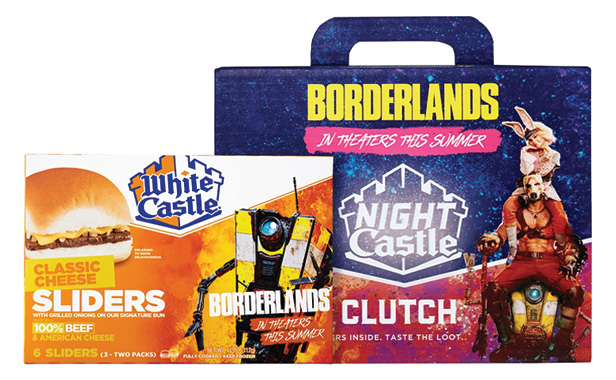Strategy July 10, 2024
White Castle Enters ‘Borderlands’ With Augmented Reality Packaging
The quick-service chain has partnered with Lionsgate to promote the Borderlands film adaptation with product packaging that brings ‘Borderlands’ characters to life.
White Castle has released limited-edition product packaging that features augmented reality experiences from the bestselling video game franchise Borderlands, ahead of the game’s Lionsgate film adaptation premiering on Aug. 9.

White Castle’s use of augmented reality in its product packaging collaboration with the upcoming Borderlands film adaptation is just the latest example of a brand incorporating AR into its marketing and advertising.
The branded products include six-count packs of White Castle sliders in retail stores (either the Original, Classic Cheese or Jalapeño Cheese varieties), as well as 20-slider packs (“Crave Clutches”) and large soft drink cups in restaurant.
Once customers purchase their items, they can use their smartphones to scan the QR code on the packaging to bring Claptrap – a robot character from the franchise – to life in one of seven different augmented reality (AR) experiences.
“This collaboration with Borderlands is upping the ante by allowing Cravers across the country to bring this awesome franchise directly into Castles as well as into their own kitchens and dining rooms,” said Jamie Richardson, vice president at White Castle, in a statement.
AR is different from virtual reality in that it adds virtual elements to a viewer’s surroundings, rather than replacing the “real world” entirely in the viewer’s line of vision. And when it’s combined with strategic partnerships, it can help to produce a bit of branding buzz while also providing important information or entertainment for consumers.
White Castle is far from the first brand to turn to AR-enhanced packaging for interactive promotion. Chobani produced a “trick or treat”-themed AR mini game in the fall that revealed themed cartoons or merch options when users scanned the QR codes on multipack Halloween-themed yogurts. In 2019, Burger King ran a viral “Burn That Ad” campaign that let people point their cameras at McDonald’s ads and set them on fire in-app in exchange for a free Whopper.
Exhibitor Magazine wrote earlier this year that technology-driven immersive experiences, like AR, are slowly becoming nonnegotiable at trade shows and similar events. Promo and print industry professionals who want to get in on the trend then might consider trade shows as a venue for incorporating AR into their brand and reaching new customers. Suppliers and distributors can add scannable QR codes with AR-enhanced activities to already common trade show giveaways – like tote bags or bookmarks – to stand out in a sea of tables.
There’s also opportunity for AR incorporation into product demos – particularly in an industry that necessitates so much customization. Some suppliers, like Spector & Co. (asi/88660) and SnugZ USA (asi/88060), both Top 40 companies, have already tested AR services to aid in approving product samples and visualizing what a customized product might look like in the real world.
